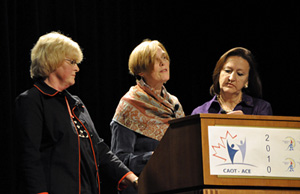 |
| Elizabeth Townsend (centre) is joined by colleagues Mary Law from McMaster (left) and Helene Polatajko of the University of Toronto (right) as she delivers her keynote speech. (Tracey Crowell photo) |
Since 1982, ║┌┴¤│ď╣¤═°ÔÇÖs School of Occupational Therapy has been turning out world-class occupational therapists who have gone on to have successful careers in many different fields. Dr. Townsend was instrumental in the opening of the school, which has now produced┬ámore than┬á1,000 alumni and remains the only school for occupational therapy in the Atlantic provinces.
ÔÇťI was tantalized by the possibility of creating a vibrant new curriculum particularly that would bring out the possibilities for occupational therapy,ÔÇŁ she says of her decision to get involved in the school so many years ago, which has helped to significantly increase the number of occupational therapists who live and work in the region.
Occupational therapy is defined by CAOT as ÔÇťthe art and science of enabling engagement in everyday living, through occupation; of enabling people to perform the occupations that foster health and well-being; and of enabling a just and inclusive society so that all people may participate to their potential in the daily occupations of life.ÔÇŁ
ÔÇťItÔÇÖs one of the broadest and most flexible professions anywhere,ÔÇŁ says Dr. Townsend, explaining that occupational therapists donÔÇÖt only work in hospitals, but in many different sectors such as transportation. Her research has focused on areas of mental health and the ways in which mental health systems either support or limit possibilities for people to live well. ÔÇťIt was out of doing that critique and analysis that I realized that the philosophic foundations of occupational therapy are congruent with philosophic ideas of social justice."
ÔÇťI was attracted to occupational therapy because I saw the possibility of making a difference by seeing the potential in people that others couldnÔÇÖt see.ÔÇŁ
Dr. Townsend says that the opportunities that ║┌┴¤│ď╣¤═°provided her during her time here have opened many doors. ÔÇťMy time at ║┌┴¤│ď╣¤═°has been characterized by incredible opportunities to be creative, to create an innovative curriculum, to make international connections, and to become involved in the national scene in shaping what we do to help people live a more meaningful life, even when they have what would seem to others to be challenges.ÔÇŁ
She has nothing but good things to say about the many students who have come through the school during her time there. ÔÇťMy experience is of huge pride. There is a sense of putting ║┌┴¤│ď╣¤═°on a world stage where our alumni are highly respected around the world. I get letters from students in New Zealand, Australia, or India saying how proud they are of being a ║┌┴¤│ď╣¤═°occupational therapy graduate.ÔÇŁ
Professor Townsend will remain at ║┌┴¤│ď╣¤═°as a professor emeritus. She encourages students to look at occupational therapy as a possible career choice, citing an affinity for thinking outside of the box, willingness to use both sides of the brain and to work across disciplines, a passion for advancing justice in the world, and creativity as characteristics of potentially great occupational therapists.
These are all areas Dr. Townsend knows a thing or two about. Crystal Grass, an Assistant Professor in the department, says that many view Dr. Townsend as a visionary. ÔÇťShe has a view to the future of whatÔÇÖs possible.ÔÇŁ
